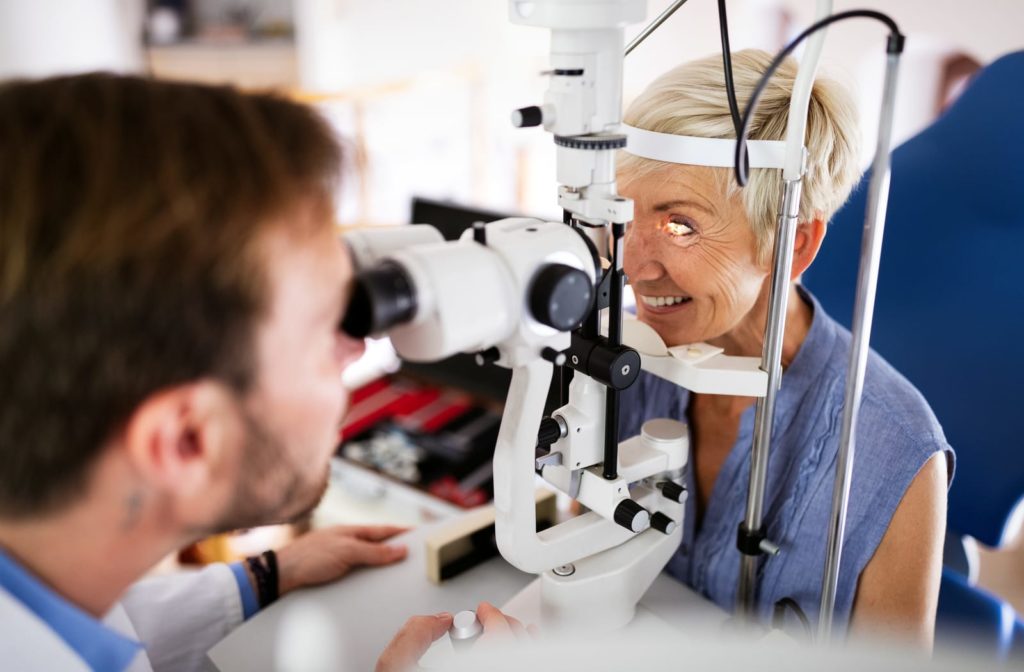Optometrists preach about the importance of eye exams for seniors a lot. And it’s true, eye exams really are a crucial part of visual and optical health for patients of all ages. But we don’t always take the time to explain why exams are so important, especially for seniors.
It’s up to optometrists to help their patients understand how their eye health changes, what that means for their vision, and what they can do about it. So with that in mind, let’s discuss the unique challenges associated with aging eyes.
How Aging Changes Your Eyes
Vision changes as you get older because your eyes undergo structural changes. This isn’t only true in your later years; it happens throughout your entire life. For example, children’s eyeballs grow longer as they get older. If a child is nearsighted, the growth makes their vision get progressively worse.
Presbyopia and cataracts are two conditions that develop due to normal structural changes in the eye during adulthood. We often associate these changes with seniors. However, both conditions can start to develop as early as your 40s.
Presbyopia
Presbyopia is the reason that everyone needs reading glasses eventually.
As light enters your eye, it passes through something called the crystalline lens. The crystalline lens is a clear, flexible piece of tissue that helps focus light properly. Your lens changes shape to focus light differently, depending on what you’re looking at.
As you get older, the lens starts to harden. The less flexible the lens, the less your eyes can focus on near objects.
Cataracts
Cataracts are another type of structural change that takes place in the crystalline lens.
The lens is made of proteins, which are evenly spaced to allow light to pass through. As you age, the proteins in the lens restructure, leaving less space between them. As a result, you start noticing cloudier vision with less vibrant colors. The proteins continue to restructure until, eventually, they become too dense to allow light to pass through properly, leaving the patient virtually blind.
Cataracts are technically the leading cause of blindness worldwide. However, they can be totally reversed with fairly simple surgery. So, while the effects of cataracts are severe, they’re not necessarily permanent in countries with reasonable access to healthcare.

Blindness & Vision Loss in Seniors
For most people, vision is our dominant sense, which means we rely on it the most when gathering information and interacting with the world around us. The second most dominant sense is hearing.
Life without any of the 5 senses is very difficult. However, sight and sound can often compensate for each other or other senses to some extent.
Approximately ⅓ of Americans over 65 suffer from hearing loss. Without proper hearing, seniors need their vision to stay safe, aware, and as independent as possible. If nothing else, losing your vision and your hearing is incredibly isolating, making it difficult to connect or communicate with anyone.
There are several eye diseases and conditions that can result in permanent vision loss. The two that are perhaps most commonly associated with age are glaucoma and macular degeneration.
Glaucoma
Glaucoma is an eye disease that causes gradual and permanent damage to the optic nerve. Your optic nerve is responsible for transmitting messages from your eyes to your brain. Once the optic nerve is damaged, the eyes and the brain can no longer communicate effectively.
Glaucoma usually develops slowly without any noticeable symptoms. By the time patients are aware of the changes to their vision, they have typically already suffered significant vision loss.
Macular Degeneration
Macular degeneration (also known as age-related macular degeneration or AMD) is a condition that damages the macula.
The back of your eyeball is covered with a delicate system of tissues called the retina. In the middle of the retina is a small area called the macula. The macula is especially light-sensitive and is responsible for distance vision, which allows you to see details like numbers, letters, and facial features.
Macular degeneration occurs when the macula becomes damaged by drusen or scar tissue. Much like glaucoma, the damage develops slowly over time. Most patients don’t notice any symptoms until they’ve already lost a significant portion of their central vision.
How Senior Eye Exams Help You Maintain Healthy Eyes
Many of the issues associated with aging eyes are asymptomatic, meaning they develop without producing noticeable symptoms. Senior eye exams are necessary because they can detect structural changes to your eyes before they start causing significant permanent damage.
Most optometrists offer advanced diagnostic testing to evaluate your eye health. These diagnostic tests allow us to view the inner structures of your eyes. We can see changes, even when they’re in the early stages, and start treating the issue right away. The earlier we treat the problem, the less of a problem it becomes.
Eye exams also allow us to ensure your prescription is up to date. Some conditions like cataracts cause your prescription to change faster than normal. In order to keep you safe and independent, we need to make sure your prescription is still giving you the best vision possible.
You Cannot Afford to Neglect Your Eyes
Most of us rely on our vision to maintain our lifestyles. If you want to stay independent and active, it’s absolutely crucial that you schedule an eye exam at least once a year. Working proactively to keep your eyes healthy will help preserve your vision and keep your lifestyle intact.




